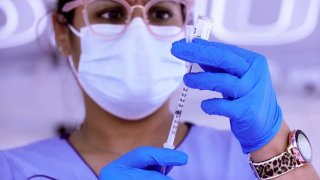
- U.S. health regulators lifted a recommended pause on the use of Johnson & Johnson's Covid-19 vaccine, giving state and local officials backing to distribute the doses.
- The CDC's Advisory Committee on Immunization Practices recommended on Friday the continued use of the J&J vaccine.
- On April 13, the FDA and CDC asked states to temporarily halt using J&J's vaccine "out of an abundance of caution" following reports that six women, ages 18 to 48, developed a rare blood clotting disorder.
U.S. health regulators on Friday lifted a recommended pause on the use of Johnson & Johnson's Covid-19 vaccine, giving state and local officials backing to distribute the doses, which are seen as critical in getting lifesaving shots to hard-to-reach communities.
WATCH ANYTIME FOR FREE
>Stream NBC10 Boston news for free, 24/7, wherever you are. |
The announcement from the Centers for Disease Control and Prevention and the Food and Drug Administration comes after the CDC's Advisory Committee on Immunization Practices, known as ACIP, recommended earlier Friday for the continued use of the J&J vaccine, saying the benefits of the shot outweighed the risk. The committee is an outside panel of experts that advises the CDC.
Members of the advisory panel didn't recommend U.S. regulators restrict the use of the J&J vaccine based on age or gender, but they did propose that the Food and Drug Administration consider adding a warning label for women under the age of 50.
Get updates on what's happening in Boston to your inbox. Sign up for our >News Headlines newsletter.
In a statement late Friday, the FDA and CDC said they were confident that the vaccine is safe and effective in preventing Covid-19, adding the risk of the blood clots is "very low."
"Safety is our top priority," Acting FDA Commissioner Dr. Janet Woodcock said in a statement. "This pause was an example of our extensive safety monitoring working as they were designed to work—identifying even these small number of cases."
"We've lifted the pause based on the FDA and CDC's review of all available data and in consultation with medical experts and based on recommendations from the CDC's Advisory Committee on Immunization Practices," Woodcock said. "We have concluded that the known and potential benefits of the Janssen COVID-19 Vaccine outweigh its known and potential risks in individuals 18 years of age and older."
Money Report
During a press conference on the announcement, Woodcock said health-care providers should review revised fact sheets from the FDA about the vaccine, which includes details about rare blood clots. People who have questions about the vaccine should discuss with a health-care provider, she said.
J&J's Covid-19 vaccine, like Pfizer's and Moderna's shots, received an emergency use authorization from the FDA to start distributing the doses across the U.S. An EUA grants conditional clearance based on two months of safety data, pending another submission for full approval, which usually requires at least six months of data.
On April 13, the FDA and CDC asked states to temporarily halt using J&J's vaccine "out of an abundance of caution" following reports that six women, ages 18 to 48, developed cerebral venous sinus thrombosis in combination with low blood platelets. CVST occurs when a blood clot forms in the brain's venous sinuses. It can prevent blood from draining out of the brain and can eventually cause a hemorrhage and other brain damage.
Within hours of the warning from U.S. regulators, more than a dozen states, along with some national pharmacies, halted inoculations with J&J's vaccine. Some locations replaced the J&J shots for scheduled appointments with either the Pfizer or Moderna vaccine.
The U.S. government was expected to lift the recommended pause shortly after the favorable vote from the committee.
Prior to Friday's vote, the committee debated whether to recommend against the use of J&J's vaccine or endorse it with U.S. regulators enforcing a warning label. The committee also considered limiting the vaccine's use based on age or other risk factors.
During the meeting, CDC official Dr. Tom Shimabukuro said there have been no reports of the condition in those who received the Pfizer-BioNTech mRNA vaccine. There were three reports of CVST in patients who received the Moderna vaccine, he said, though the patients didn't have the low level of blood platelets seen in the J&J recipients.
Blood platelets help the body form clots to heal wounds. U.S. health officials warned the use of a treatment like blood thinner heparin on those with low blood platelets could make their condition worse.
Rare blood clots with low platelets are occurring at a rate of 7 per 1 million vaccinations in women ages 18 to 49 for the J&J shot and 0.9 per 1 million in women age 50 and older, according to a slide presented at the CDC panel meeting. CDC has confirmed 15 cases total of rare blood clot conditions, which includes 12 women who developed blood clots in the brain. Three women died and 7 remained hospitalized, according to the presentation.
There are no confirmed cases in men, though officials have said they are reviewing potential additional cases.
Dr. Michael Streiff, a hematologist at Johns Hopkins University School of Medicine, said the condition, in normal circumstances, is very rare. "I can tell you from my experience, treating these patients, I've just never seen it," he told the committee during a presentation Friday.
Earlier this week, J&J said it would resume the rollout of its vaccine in Europe after regulators there backed the single-shot vaccine with the recommendation that a warning be added to the label. The European Medicines Agency researched all available evidence, it said, including the reports from the United States.






